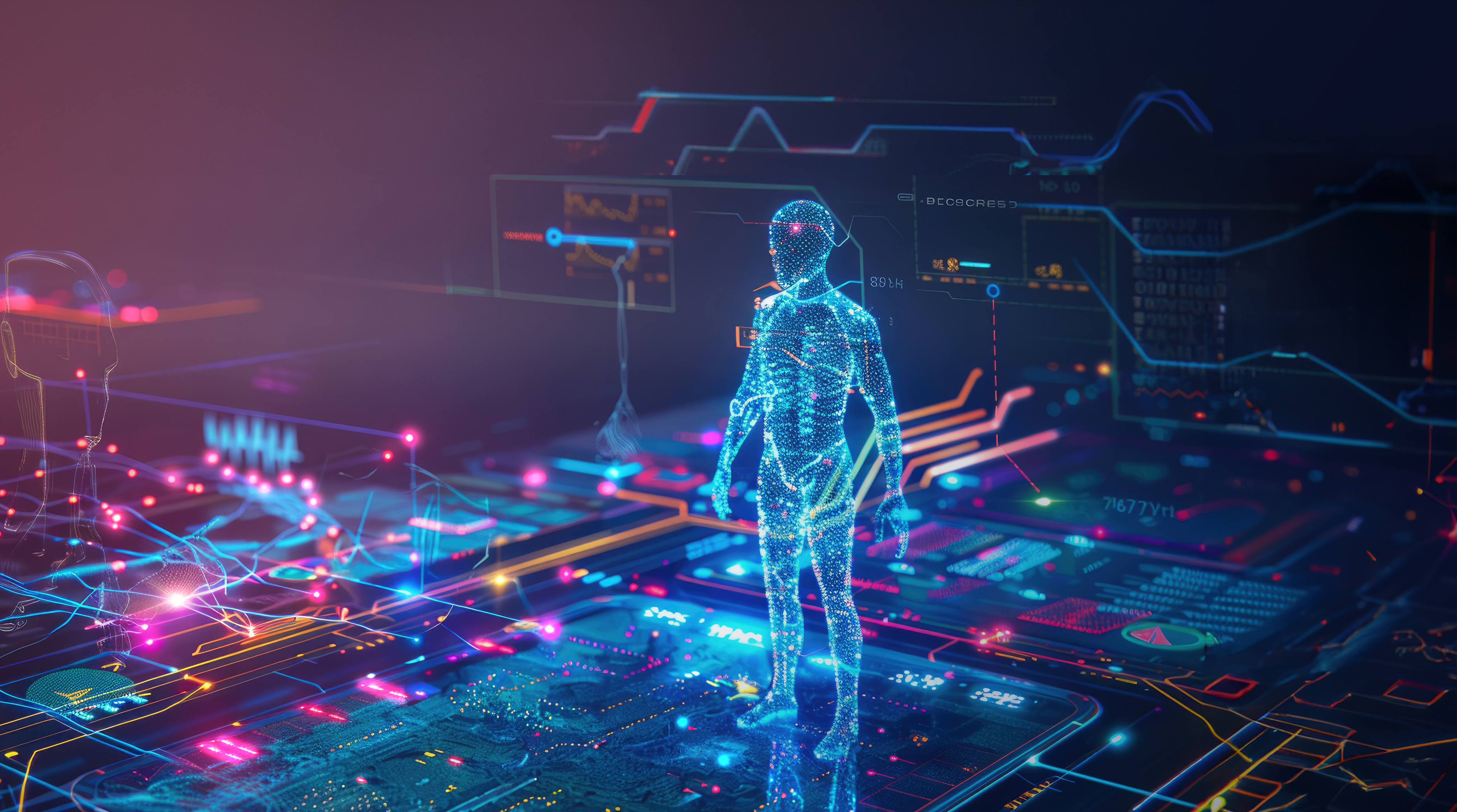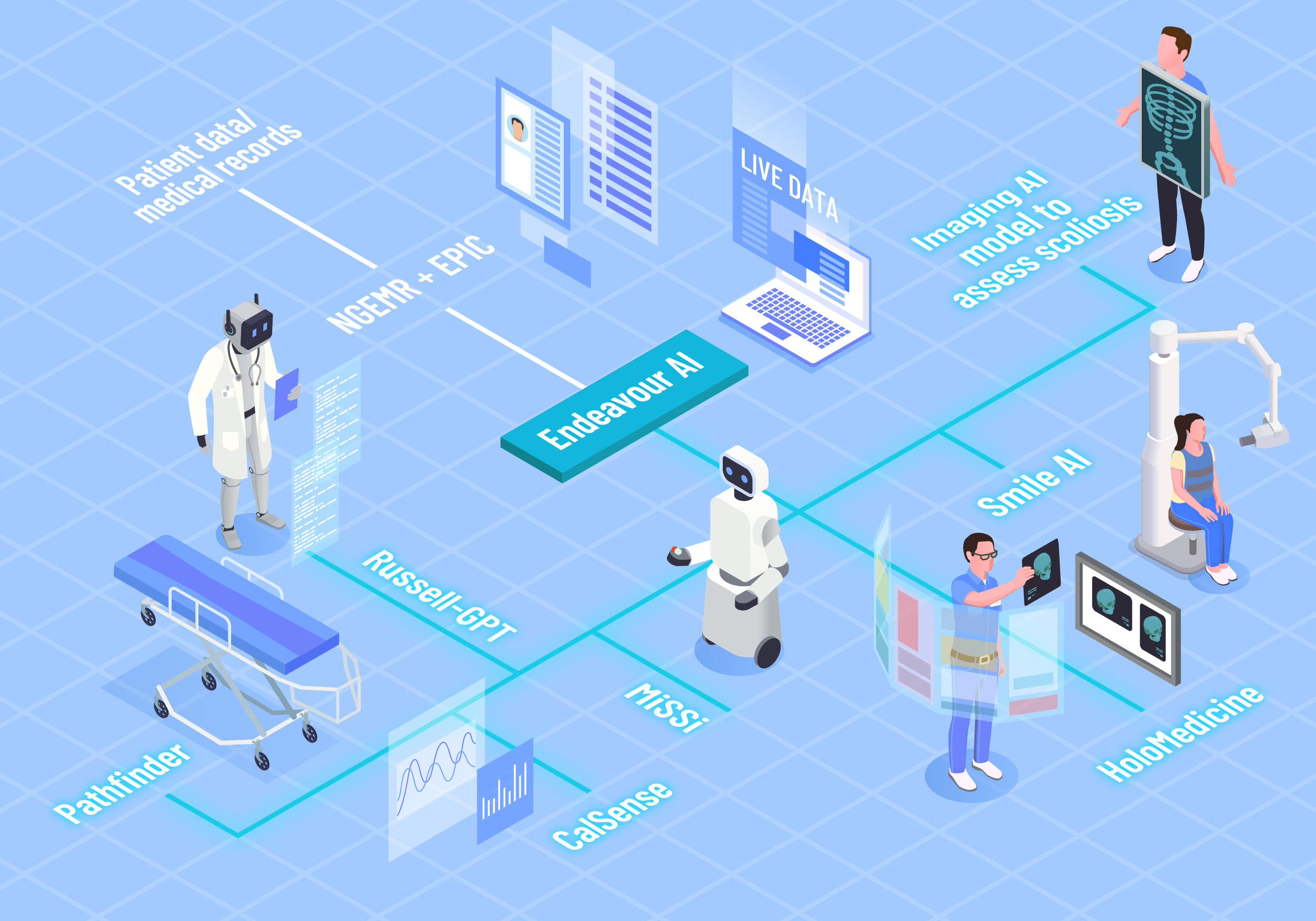Learn how artificial intelligence is shaping healthcare at the National University Hospital,
from enhancing diagnostic accuracy to predicting patient outcomes to streamlining administration.
Issue 5 | July 2024

 Subscribe and ensure you don't miss the next issue!
Subscribe and ensure you don't miss the next issue!
The emergence of artificial intelligence (AI) has generated much hype — and even making it to many ‘Word of the Year’ lists in 2023. In the world of healthcare, there are signs that it is indeed transformational. AI has brought about earlier detection, better diagnoses, individualised support for patients, and greater operational efficiency.
Singapore is one of the major adopters of AI in healthcare in the world, espousing a three-pronged approach towards the use of the technology: developing enablers and common platforms for easy deployment; partnering to enhance healthcare professionals’ proficiency with AI; and adopting new technologies like generative AI for agile, safe and secure application.
At the National University Hospital (NUH), AI-driven initiatives abound. The technology is already part of daily conversations at the hospital, as data-driven applications run behind the scenes — collecting, consolidating and crunching seas of patient information to streamline everything from patient management to administrative tasks.
AI galore
The Next Generation Electronic Medical Record (NGEMR) Programme has enabled every patient to have a single, comprehensive medical record across all healthcare institutions, including NUH, under the umbrella of the National University Health System (NUHS) and National Healthcare Group (NHG). Meanwhile, EPIC, a software platform, makes information accessible by the care providers. These systems provide a holistic view of a patient’s medical history—leading to more efficient care management and delivery.
The Endeavour AI platform integrates live data from NGEMR to compute multiple AI insights. It features a live dashboard which gathers, processes and displays key medical data of all patients across NUH, as well as the NUHS cluster, which is utilised to support various AI tools.
Explore the AI-powered tools currently being implemented and developed at NUH.

| AI tools | Function(s) | Benefit(s) |
| Pathfinder | Provides real-time insights into waiting times and bed occupancy rates in the Emergency Department (ED).
Tracks departmental statistics such as waiting time and predicts daily patient turnout up to a week in advance. | Empowers the ED to make more informed, data-driven decisions about how best to optimise resource allocation.
Reduces bottlenecks and improves the efficiency of care delivery by allowing ED staff to adjust manpower and streamline patient admissions based on anticipated demand. |
| CalSense | A platform that consolidates, processes and visualises patients’ blood tests to flag hypercalcaemia, as early detection and treatment could prevent complications such as osteoporosis, kidney stones and potentially cardiac death.
Automates the detection of hypercalcaemia, providing real-time alerts to healthcare professionals. | Improves the speed and accuracy at which doctors address hypercalcaemia, enhancing the management of the disease across NUHS, as well as national specialty centres and polyclinics.
Accelerates the diagnostic and treatment cycle, thus reducing the administrative burden on doctors and shortening the waiting time for patients. |
| MiSSi | NUH’s first multifunction cloud robot in patient care.
The MiSSi cloud robot combines AI large language models and novel contactless sensor technology to handle non-nursing tasks such as medication dispensing, contactless recording of vital signs and preventing falls in high fall-risks patients. | Reduces the strain on nurses, allowing them to dedicate more time to direct patient care. |
| HoloMedicine | Virtual and augmented reality in clinical care.
Software converts a patient’s CT or MRI scans into 3D holograms, with which surgeons can interact using hand gestures.
Used in over 100 surgical cases across nine specialisations such as neurosurgery, cardiac, liver transplant, endocrine and facial reconstruction surgeries. | Useful for surgical planning as it provides a more accurate visualisation of the patient’s spatial anatomy, especially for surgeries involving more complex organs. |
| Imaging AI model to assess scoliosis | The model automatically measures the degree of scoliosis and augments the performance of the doctor interpreting X-ray scans. | Reduces reporting time and increases accuracy, which leads to enhanced productivity due to fewer hours spent on interpreting X-rays. |
| Russell-GPT | Performs administrative tasks such as summarising patient case notes and drafting referral letters.
Leverages AI to analyse historical data of 250,000 patients to forecast a patient’s healthcare journey. | Reduces the administrative workload of doctors and nurses so they can redirect more time towards patient care.
Diminishes the potential for human errors.
Enables doctors to optimise care levels and resource allocation, ensuring that patients receive the right care at the right time. |
| Smile AI | Underpinned by a machine learning model that creates 3D dental scans to generate digital representations of patients’ teeth and their positions in a few minutes.
Another model uses X-rays of the upper and lower jaws to predict gum disease. | Enables dentists to provide patients with rapid, comprehensive insights into their oral health, enabling more timely and personalised treatments. |
Like this article? Simply subscribe to make sure you don't miss the next issue of EnvisioningHealth!





















